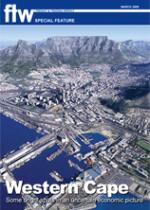Heartening news for the Western
Cape fruit industry and its many
players in the production chain,
is that the region’s reefer exports are
expected to perform well this year.
Safmarine reefer executive, Jan
Kruger, tells FTW the carrier’s reefer
exports got off to a good, strong, early
start despite the downturn in the global
economy.
An indication of this positive trend
was the launch in February of the Saecs
Reefer Express – operated by one
vessel apiece from Safmarine, DAL
and Maersk Line – which in no way
changes the existing profile of the Saecs
intermediate service, currently operating
as a fortnightly, four-vessel service.
Favourably received by the perishable
export industry, the fledgling service will
also offer much-needed capacity for dry
cargo exported in 20-foot GPs, though
such volumes exported from the Western
Cape declined in the last quarter of 2008
and are expected to continue on similar
lines for much of 2009.
Even though the range of perishable
products exported out of South Africa
has expanded, Safmarine does not expect
too many changes in the overall mix,
given the dominance of crops such as
apples, oranges and pears.
Citrus and deciduous currently
account for approximately 55% and 40%
of all export volumes, the remaining 5%
made up mainly of avocados, meat and
fish.
Strong export growth has been
reported in flower and vegetable exports,
much of it airfreighted.
Safmarine has also noted an increase
in the volumes and types of perishable
produce previously airfreighted or
trucked now being shipped by sea.
Safmarine’s reefer volumes from
South Africa were up in 2008, declining
slightly in December. The carrier
estimates that 75% of the country’s core
fruit export trade to Europe was being
moved in containers by the end of last
year, though the trend of moving by
conventional mode to reefer containers
has not continued at the same pace
as before.
What is more, the diminished
availability of conventional vessels will
likely continue to drive the demand for
reefer containers, which offer a number
of advantages over conventional modes
of shipment. Key to these is that the per
unit carbon emission/footprint tends to
be lower by sea than air or road.
Indeed, Safmarine expects
environmental issues to have more
influence on the reefer shipping business
and on sourcing programmes in general,
and is making its contribution in this
respect by investing in new reefer
equipment with the most fuel-efficient
compressors and environmentally
friendly refrigerants.
The line is also working closely with
its customers to address environmental
and carbon footprint concerns.
Total containerised reefer exports
from South Africa (all shipping lines,
all reefer exports) continued to grow in
2008 as the trade showed single digit
growth over the previous year.
Trade lanes performing particularly
well were the South Africa to Middle
East and South Africa to Europe trades,
as well as all trade to West and East
Africa, intra Europe and South America.
While the downturn in the global
economy was felt, particularly at the end
of 2008/early 2009, Safmarine remains
cautiously optimistic it will reach targets
set for this year.
“People may postpone buying a new
car during rough times but they still
have to eat,” says Marc Rooms, reefer
marketing for Safmarine’s Antwerpbased
trades.
Safmarine expects 2009 to be year of
consolidation for its reefer business, its
principal focus being on consolidating
the custom it has built up over the years,
while also aiming to increase reefer
liftings in existing markets.
Safmarine
25 Mar 2009 - by Ray Smuts
0 Comments
Western Cape 2009

25 Mar 2009
25 Mar 2009
25 Mar 2009
25 Mar 2009
25 Mar 2009
25 Mar 2009
25 Mar 2009
25 Mar 2009
25 Mar 2009
Border Beat
Featured Jobs
New
